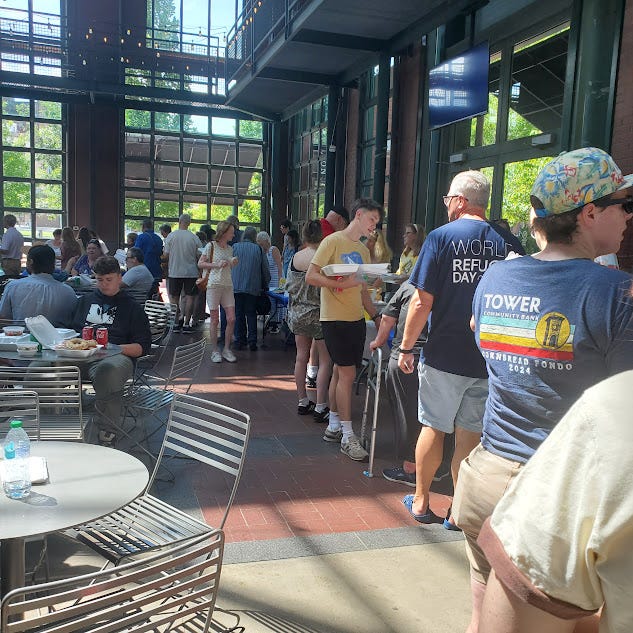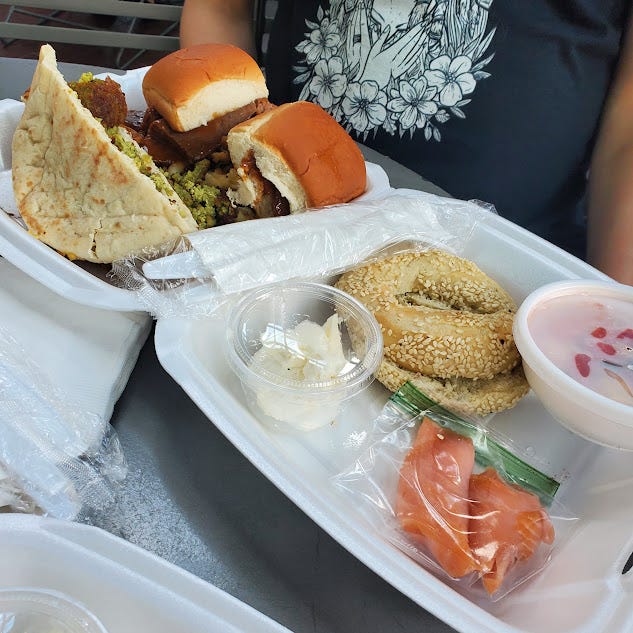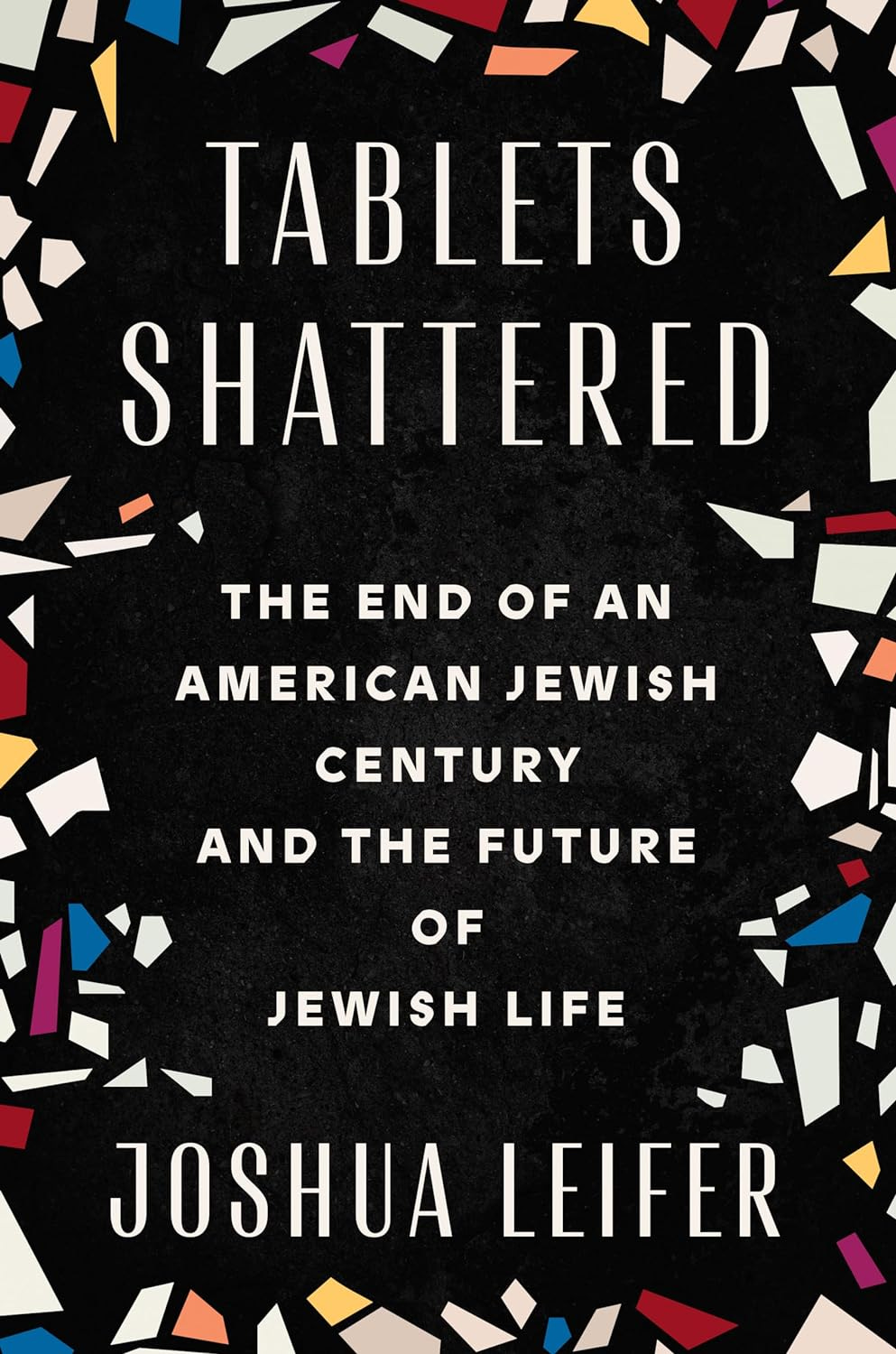Last weekend, we had the joy of attending Nosh-a-Nooga, Chattanooga’s first Jewish Food Festival, put on my the Jewish Federation of Greater Chattanooga.
The place was hopping. Organizers estimate more than a thousand people attended. We went with some initial trepidation; as the semester was gearing up, I was growing increasingly worried that the unrest from last semester would finally find our campus, and that there might be “practice protests” at this event. I think the city was also worried about this, because there were a lot of police officers. Like, a lot a lot. But neither the city nor I needed to be; the only protestation I heard was “you know, matzah balls covered in cinnamon and sugar is maybe not the best idea Ashkenazi Jews have ever had.” And I’ll be honest, I’m in the corner of the several people I heard make such a remark.
There have also been no protests or strikes on our campus, at least that I’m aware of, and I’m also grateful for that.
There were people there from each of Chattanooga’s three congregations (B’nai Zion, where I am a member; Mizpah, where our cousin Lillian was Rebbetzin for many years; and Chabad.) Some of the food was kosher, some of the food was not, and although meat and dairy were on opposite sides of the pavilion, nobody hesitated to put meat in Dominik’s Styrofoam container, in spite of the obvious cream cheese. (Also, were I to ever be in a band again, I think “Obvious Cream Cheese” would be a great name; we could do klezmer covers of shmaltzy songs, like Seasons in the Sun and You Light Up My Life. In fact, anyone wanna start a band with me? I can’t play anything or sing, but I make very cool flyers.)
This is all a very long introduction to a short bit of thinking about Tablets Shattered, the most recent book by Joshua Leifer. I’m only a little way into it, and I was spurred to read it by this mishegas. (If you haven’t been following this drama, I encourage you to read the article and to click on the statement by the bookstore owner… we got an apology and a commitment of support, and I gotta tell you, that is both rare and very needed. The story starts out bad, but it gets good, I promise.)
I’ll be honest, I don’t think I’m going to like this book. It seems to have, at least in these early chapters, a mission to suggest the ways in which Jews should go about being Jews, a thing with which I have very little patience. You Jew your way, I’ll Jew mine, and we will both meet up at Nosh-a-Nooga and give the sweet kneidlach side-eye. (This reliance on Jewish culture, which Leifer diminishes as “kitsch,” as the glue that holds disparate Jewish communities with vastly different minhag together is one of the ways in which he thinks we’re Jewishing wrong. Me, I think it is one of our strengths.) He and I also disagree about Israel, and some of what he’s written feels ill-timed to me. (He acknowledges that the book was written before Oct. 7, and might be different in places had it been written after. Personally, I think he should have held up publication to make those changes.)
Shared culture may be a thin thread by which to connect a people (but it also might not be, in my opinion). But even if I give him that, it’s still a connection.
Let me tell you a story.
In my very first days in NYC, a friend took me to the (old, original) Second Avenue Deli. Knowing no better, I tried to order a Rueben. “Not kosher,” the waitress said, then gave my friend what I came to understand was the “so you’re dating a shiksah, hun?” look. He must have already known what it meant, because he jumped in to save me, “No, she’s Jewish. She’s just from Appalachia. She doesn’t even know what most of these foods are.”
The waitress walked away without taking our order, and I thought maybe we were going to be asked to leave just because I tried to order a Rueben, which seemed a little extreme to me. But soon she was going from table to table with a try full of little plates. She’d stop only at the tables with old Jews at them, and point at me, and then use a spoon to scoop a little of their lunch onto one of the plates. To a person, they turned to smile at me and nodded as she did this.
“Here,” she said, setting the plates in front of me, “this is our food.” She pointed to each: knish, stuffed derma, ptcha, farfel, matzoh brei, etc. I ate everything (even the ptcha), and if I didn’t enthusiastically love all the food, I absolutely loved the generosity. It was L’dor V’dor on the Lower East Side, and it is one of my favorite memories of my time living in the city.
So, no, shared culture isn’t all that makes us Jewish, but I disagree with Leifer about its importance. It gives us something we can always share with one another, and in sharing, remind each other that we are one people in spite of our differences.
What are your thoughts, friends?







I look forward to reading this book.
Yes, it's interesting, a Reuben, which is so commonly associated with NY deli culture, is not kosher. It has meat and cheese on the same sandwich. Wish there was a way to make it kosher. Maybe omit the cheese and add extra Russian Dressing?
I like the idea of "glue" holding a culture together. I've used that term before. The "glue" that has once held our culture together (as well as other cultural/religious groups over the last century) has disintegrated. The coherent, cohesive communities of the past are no longer here. :(
This absolutely is one of my favorite essays on the topic of being a Jew. Good natured humor…
Your mama is proud.